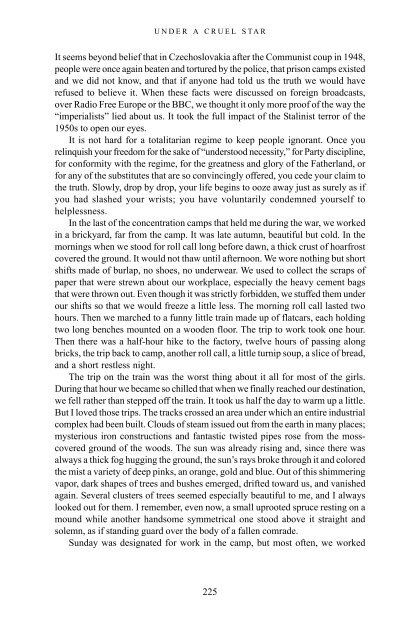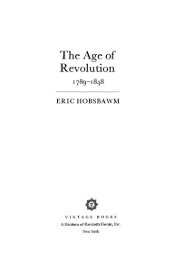The_Holokaust_-_origins,_implementation,_aftermath
The_Holokaust_-_origins,_implementation,_aftermath
The_Holokaust_-_origins,_implementation,_aftermath
Create successful ePaper yourself
Turn your PDF publications into a flip-book with our unique Google optimized e-Paper software.
UNDER A CRUEL STAR<br />
It seems beyond belief that in Czechoslovakia after the Communist coup in 1948,<br />
people were once again beaten and tortured by the police, that prison camps existed<br />
and we did not know, and that if anyone had told us the truth we would have<br />
refused to believe it. When these facts were discussed on foreign broadcasts,<br />
over Radio Free Europe or the BBC, we thought it only more proof of the way the<br />
“imperialists” lied about us. It took the full impact of the Stalinist terror of the<br />
1950s to open our eyes.<br />
It is not hard for a totalitarian regime to keep people ignorant. Once you<br />
relinquish your freedom for the sake of “understood necessity,” for Party discipline,<br />
for conformity with the regime, for the greatness and glory of the Fatherland, or<br />
for any of the substitutes that are so convincingly offered, you cede your claim to<br />
the truth. Slowly, drop by drop, your life begins to ooze away just as surely as if<br />
you had slashed your wrists; you have voluntarily condemned yourself to<br />
helplessness.<br />
In the last of the concentration camps that held me during the war, we worked<br />
in a brickyard, far from the camp. It was late autumn, beautiful but cold. In the<br />
mornings when we stood for roll call long before dawn, a thick crust of hoarfrost<br />
covered the ground. It would not thaw until afternoon. We wore nothing but short<br />
shifts made of burlap, no shoes, no underwear. We used to collect the scraps of<br />
paper that were strewn about our workplace, especially the heavy cement bags<br />
that were thrown out. Even though it was strictly forbidden, we stuffed them under<br />
our shifts so that we would freeze a little less. <strong>The</strong> morning roll call lasted two<br />
hours. <strong>The</strong>n we marched to a funny little train made up of flatcars, each holding<br />
two long benches mounted on a wooden floor. <strong>The</strong> trip to work took one hour.<br />
<strong>The</strong>n there was a half-hour hike to the factory, twelve hours of passing along<br />
bricks, the trip back to camp, another roll call, a little turnip soup, a slice of bread,<br />
and a short restless night.<br />
<strong>The</strong> trip on the train was the worst thing about it all for most of the girls.<br />
During that hour we became so chilled that when we finally reached our destination,<br />
we fell rather than stepped off the train. It took us half the day to warm up a little.<br />
But I loved those trips. <strong>The</strong> tracks crossed an area under which an entire industrial<br />
complex had been built. Clouds of steam issued out from the earth in many places;<br />
mysterious iron constructions and fantastic twisted pipes rose from the mosscovered<br />
ground of the woods. <strong>The</strong> sun was already rising and, since there was<br />
always a thick fog hugging the ground, the sun’s rays broke through it and colored<br />
the mist a variety of deep pinks, an orange, gold and blue. Out of this shimmering<br />
vapor, dark shapes of trees and bushes emerged, drifted toward us, and vanished<br />
again. Several clusters of trees seemed especially beautiful to me, and I always<br />
looked out for them. I remember, even now, a small uprooted spruce resting on a<br />
mound while another handsome symmetrical one stood above it straight and<br />
solemn, as if standing guard over the body of a fallen comrade.<br />
Sunday was designated for work in the camp, but most often, we worked<br />
225



